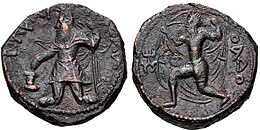| Vāyu | |
|---|---|
| Member of the Pancha Bhuta and Dikpala | |
 Vayu (dikpala), on his mount, gazelle | |
| Other names | Anila, Pavana, Vyāna, Vāta, Tanuna, Mukhyaprana, Bhima |
| Devanagari | वायु |
| Sanskrit transliteration | Vāyu |
| Affiliation | Deva |
| Abode | Vayu Loka, Satya Loka |
| Mantra | Om Vayave Namaha |
| Weapon | |
| Mount | Chariot drawn by Horses, Gazelle |
| Personal information | |
| Parents |
|
| Consort |
|
| Children | Hanuman (celestial son) Bhima (celestial son) |
| Equivalents | |
| Indo-European equivalent | H₂weh₁yú |
Vayu (Sanskrit pronunciation: [ʋaːjʊ], Sanskrit: वायु, IAST: Vāyu), also known as Vata and Pavana,[8] is the Hindu god of the winds as well as the divine messenger of the gods. In the Vedic scriptures, Vayu is an important deity and is closely associated with Indra, the king of gods. He is mentioned to be born from the breath of Supreme Being Vishvapurusha and also the first one to drink Soma.[9] The Upanishads praise him as Prana or 'life breath of the world'. In the later Hindu scriptures, he is described as a dikpala (one of the guardians of the direction), who looks over the north-west direction.[10][11] The Hindu epics describe him as the father of the god Hanuman and Bhima.[12]
The followers of the 13th-century saint Madhva believe their guru as an incarnation of Vayu.[13][14][15] They worship the wind deity as Mukhyaprana and consider him as the son of the god Vishnu.
The word for air (vāyu) or wind (pavana) is one of the classical elements in Hinduism. The Sanskrit word Vāta literally means 'blown'; Vāyu, 'blower' and Prāna, 'breathing' (viz. the breath of life, cf. the *an- in animate). Hence, the primary referent of the word is the 'deity of life', who is sometimes for clarity referred to as Mukhya-Vāyu (the chief Vayu) or Mukhya Prāna (the chief of life force or vital force).[16]
Sometimes the word vāyu, which is more generally used in the sense of the physical air or wind, is used as a synonym for prāna.[17] Vāta, an additional name for the deity Vayu, is the root of vātāvaranam, the Sanskrit and Hindi term for 'atmosphere'.[18]

In the Rigveda, Vayu is associated with the winds, with the Maruts being described as being born from Vayu's belly. Vayu is also the first god to receive soma in the ritual, and then he and Indra share their first drink.[19][20]
In the hymns, Vayu is 'described as having "exceptional beauty" and moving noisily in his shining coach, driven by two or forty-nine or one-thousand white and purple horses. A white banner is his main attribute'.[8] Like the other atmospheric deities, he is a 'fighter and destroyer', 'powerful and heroic'.[21]
In the Upanishads, there are numerous statements and illustrations of the greatness of Vayu. The Brihadaranyaka Upanishad says that the gods who control bodily functions once engaged in a contest to determine who among them is the greatest. When a deity such as that of vision would leave a man's body, that man would continue to live, albeit as a blind man and having regained the lost faculty once the errant deity returned to his post. One by one the deities all took their turns leaving the body, but the man continued to live on, though successively impaired in various ways. Finally, when Mukhya Prāna started to leave the body, all the other deities started to be inexorably pulled off their posts by force, 'just as a powerful horse yanks off pegs in the ground to which he is bound'. This caused the other deities to realize that they can function only when empowered by Vayu, and can be overpowered by him easily. In another episode, Vayu is said to be the only deity not afflicted by demons of sin who were on the attack. This Vayu is "Mukhya Prana Vayu".[22] The Chandogya Upanishad says that one cannot know Brahman except by knowing Vayu as the udgitha (the mantric syllable om).[23]

American Indologist Philip Lutgendorf says, "According to Madhva whenever Vishnu incarnates on earth, Mukhya Prana/Vayu accompanies him and aids his work of preserving dharma. Hanuman the friend and helper of Rama in the Treta Yuga, the strongman Bhima in Mahabharata, set at the end of Dvapara Yuga and Madhva in the Kali Yuga. Moreover, since the deity himself does not appear on earth until the end of kali age, the incarnate Vayu/Madhva serves during this period as the sole 'means' to bring souls to salvation".[24] Vayu is also known as Pavana and Matharishwa.
In the Mahabharata, Bhima was the spiritual son of Vayu and played a major role in the Kurukshetra War. He utilised his huge power and skill with the mace for supporting Dharma.
In East Asian Buddhism, Vayu is a dharmapāla and often classed as one of the Twelve Devas (Japanese: 十二天, romanized: Jūniten) grouped together as directional guardians. He presides over the northwest direction.[30]
In Japan, he is called Fūten (風天). He is included with the other eleven devas, which include Taishakuten (Śakra/Indra), Katen (Agni), Enmaten (Yama), Rasetsuten (Nirṛti/Rākṣasa), Ishanaten (Īśāna), Bishamonten (Vaiśravaṇa/Kubera), Suiten (Varuṇa) Bonten (Brahmā), Jiten (Pṛthivī), Nitten (Sūrya/Āditya) and Gatten (Candra).[31]